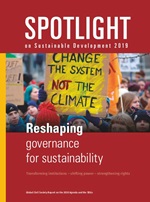Club governance: Can the world still be run by gentlemen's agreements?
Published on Mon, 2019-09-16 12:09
The 2030 Agenda for Sustainable Development clearly identifies several issues, ranging from finances, to climate to trade, where global governance agreement is required. But actual decisions on these issues often run in the opposite direction. Non-accountable ‘clubs’ exercise de facto authority and raise obstacles to implementing the SDGs. While leaders of all UN Member States decided on a transformative agenda for 2030, a de facto form of global governance, sometimes called ‘shadow governance’, works in the opposite direction. Operating in opposition to global norms as self-selected ’coalitions of the willing’ or in the interstices of national sovereignties-such as the global ‘shadow banking’ where illegal financial flows meet established financial arrangements- these major obstacles to achieving the SDGs are not loose trends or wild forces beyond control, but rather the result of a secretive but efficient network of governance ‘clubs’ that operate beyond public scrutiny or parliamentary oversight, the two accountability mechanisms identified in the 2030 Agenda. By Roberto Bissio, Social Watch. Read this chapter here. |
SUSCRIBE TO OUR NEWSLETTER



